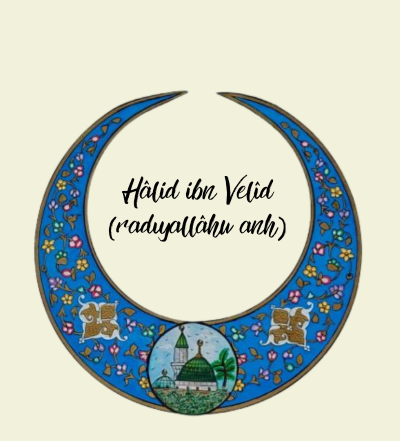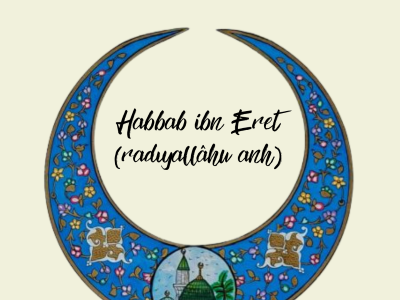In a distant time, in a distant land, the winds of the desert whispered the victory of the lions of Badr. God (glorified be His Majesty) sent a thousand angels one after another from the heavens as a promise of the victory they would achieve, to ease all worries and calm their hearts,[1] and the soil of the valley of Badr witnessed one of the most significant battles recorded in history. From the battle of Badr, where Islam was honored and disbelief was humiliated, the Prophet Muhammad (peace and blessings be upon him) and the Muslims returned with a glorious victory. Abu Sufyan and his wife Hind bint Utbah, shaken by their heavy defeat in the Battle of Badr, were burning with the rage of losing their relatives.[2]
A full year had passed since the victory of Badr in the third year of the Hijra. The polytheists of Quraysh, having licked their wounds from their heavy defeat in the Battle of Badr, were marching from Mecca to Medina with a new army for a tough fight. This move reflected their desire to halt the rise of Islam. In Medina, the believers, united under the leadership of the Pride of the Universe, our Prophet (peace and blessings be upon him), were preparing to march resolutely and courageously towards the enemy. They were aware of the great threat posed by the Quraysh army, supported by other tribes, consisting of 3000 camels and 200 horses. The army was led by Abu Sufyan with Khalid ibn al-Walid (may God be pleased with him) in command of the cavalry. Faith and disbelief would meet once again.
Dawn was breaking. The sand grains touched by the sun’s rays were gleaming like gold. The Prophet (peace and blessings be upon him), in his final sermon before the battle, had instructed the archers positioned on Mount Aynayn not to move from their places even if they saw that they had completely routed the polytheists and penetrated their ranks. The strategic importance of Mount Aynayn was realized at the start of the battle. Khalid ibn al-Walid (may God be pleased with him), with 200 cavalrymen, held the right flank; he waited for the right moment, seeking an opening to attack the believers from behind. Recognizing the strategic importance of Mount Aynayn and planning to deliver a major blow by encircling the Muslims from the rear, Khalid directed the cavalry of the Meccan army there but was repelled three times by the archers on the hill. As the battle progressed, the ranks of the Islamic army on the hill began to relax. The archers, who were emphatically told by the Prophet (peace and blessings be upon him) not to leave the hill until he ordered them, thought victory was assured when they saw the polytheists beginning to flee and forgot his warning. Despite some Companions protesting, thinking they could collect the spoils, they left the hill. Khalid ibn al-Walid and his 200 horsemen, waiting patiently without heed to the fleeing polytheists, took advantage of this opportunity and martyred a handful of Companions remaining on the hill.[3] They then started an attack from the rear against the Islamic army. The fleeing polytheists, realizing Khalid ibn al-Walid’s attack, picked up their swords again and trapped the believers between two fires. The Prophet (peace and blessings be upon him) and the noble Companions resisted this attack with all their might. The course of the battle had changed, and seeing the Muslims quickly regroup, Abu Sufyan and the polytheists, unable to face defeat, retreated and left the valley of Uhud. Ultimately, this temporary shake-up resulted in a victory for the Prophet (peace and blessings be upon him) and his Companions.[4] Khalid ibn al-Walid, leading the cavalry of the Qurayshites in this battle, demonstrated his exceptional military intelligence, patience, vigilance, and quick decision-making skills.
With their victories, political alliances, and developed commercial relations, the believers began to have a say. The polytheists realized they could no longer stop this rise through warfare and signed the Treaty of Hudaybiyyah with the Muslims. However, Khalid ibn al-Walid had been against this treaty from the beginning. Therefore, not wanting to encounter the Muslims and the Prophet (peace and blessings be upon him), who were to stay in Mecca for three days as per the treaty, he left Mecca and went to the Bedouin family he grew up with.
When the Prophet (peace and blessings be upon him) arrived in Mecca, he inquired about Khalid ibn al-Walid and left him a message. Khalid’s brother, Walid ibn al-Walid (may God be pleased with him), delivered the Prophet’s (peace and blessings be upon him) message to Khalid through a letter. The letter contained the following lines: “A person like Khalid cannot be ignorant of Islam. If he directed his anger and indignation together with the Muslims against the polytheists, it would be better for him. We would also prefer him over others.”[5]
Khalid, who returned from every battle against the Prophet (peace and blessings be upon him) with a heavy heart, realized with this message that this new light in his soul was stronger than his sword and made his decision. Taking Uthman ibn Talha (may God be pleased with him) with him, he set off. On the way, they met Amr ibn al-As (may God be pleased with him), who was burning with the same desires, and they continued on their journey together.
When the three friends reached the well of Abu Utbah, they heard a man calling, “O Rabah! O Rabah!” This word meant “profit” in Arabic. Then the man muttered, referring to Khalid ibn al-Walid and Amr ibn al-As, “With these two entering Islam, it means the keys to Mecca have been handed over.” When they arrived in Medina, they were welcomed by Walid ibn Walid. He told them that the Prophet (peace and blessings be upon him) was aware of their arrival and was very pleased.[6]
The seeds of Uhud began to show. The temporary defeats of the past Companions against the future Companions led Khalid ibn al-Walid and some Companions not with the fear of the glittering swords but with the zeal of the sparkle of truth to enter Islam.[7] The three Companions recited the testimony of faith in the presence of the Prophet (peace and blessings be upon him) in the Masjid al-Nabawi and became Muslims. Khalid ibn al-Walid’s military intelligence met with the faith and tranquility in his heart, and he took his place in the ranks of Islam as the Sword of God.
Famous commander Khalid had only been a Muslim for three months when the Prophet’s (peace and blessings be upon him) envoy Harith ibn Umayr (may God be pleased with him) was martyred in the lands of the Ghassanids. This tragic event was a direct cause of war. The Prophet Muhammad (peace and blessings be upon him) did not remain silent over what happened to Harith and sent a 3,000-man army to the lands of Mu’tah. Facing them was an enemy army of 250,000.[8] Khalid ibn al-Walid, obeying the commands of the Prophet (peace and blessings be upon him), participated in this battle not as a commander but as an ordinary soldier. However, the command of the army, called the Army of the Commanders,[9] became vacant when three commanders were martyred during the battle. Then the Companions chose Khalid ibn al-Walid among them as commander.[10]
Holding the banner in his hand and taking on the responsibility of command, Khalid was forced to retreat as a tactic. His main intention in this battle, where seven or nine of his swords were shattered,[11] was to safely return the trusts of the Prophet (peace and blessings be upon him) back to Medina, and so it was. That only twelve people were martyred during this seven-day battle against a powerful state could only be explained by divine favor backing the Islamic army. After the Battle of Mu’tah, the victory of the Islamic army and Khalid echoed greatly around the world.
Khalid ibn al-Walid, after embracing Islam, could only spend three years of his life with the Master of the Masters (peace and blessings be upon him). Under the command of God’s Messenger, he served as the brave commander of the cavalry and vanguard units. In these blessed duties, he clearly demonstrated his military capabilities and strength, inscribing his name in history with golden letters.
During the time of Caliph Abu Bakr (may God be pleased with him), he continued to be involved in military activities, remaining faithful to his duties. However, during the caliphate of Umar (may God be pleased with him), because the victories in the Battle of Yarmouk were entirely attributed to Khalid ibn al-Walid’s personal abilities, the caliph dismissed him from his command. According to a narration recorded by Ibn Kathir, upon learning of his dismissal, he responded with humility and a sense of obedience, saying, “The decision of the Commander of the Believers is most welcome,” and continued his duties under the new commander, Abu Ubayda ibn al-Jarrah (may God be pleased with him).[12]
Khalid was aware that positions and ranks were temporary and that absolute obedience to the caliph was essential. He set aside personal interests and placed the welfare of Islam and the believers above all else.
From the moment he became a Muslim, Khalid tirelessly raced through the ranks of Islam, leaving a significant mark in the history of Islamic conquests. Despite coming from a wealthy family and having his share of the spoils from the battles he won, he left nothing but his horse and sword when he passed away.
Khalid ibn al-Walid, dedicating his wealth, life, and abilities to the path of God, was a star shining around the Sun of Prophecy (peace and blessings be upon him). Caliph Abu Bakr (may God be pleased with him) also confirmed this with his statement: “A man like Khalid ibn al-Walid will not come into the world again.”[13]
May our Lord be pleased with Khalid and all the noble Companions.
[1] Al-Anfal, 9:75.
[2] Ümit Kesmez, Efendimiz’in (sallallâhu aleyhi ve sellem) Nurlu Hayatı, İstanbul: Muştu Yayınları, 2013, p. 195.
[3] Reşit Haylamaz, Gönül Tahtımızın Eşsiz Sultanı: Efendimiz (sallallâhu aleyhi ve sellem), İstanbul: Muştu Yayınları, 2011, p. 400.
[4] Halil Yaşar, Gönlümüzün Gülü Efendimiz (sallallâhu aleyhi ve sellem), New Jersey: Süreyya Yayınları, 2022, p. 168.
[5] İbn Sa’d, At-Tabaqat, V, p. 29; Köksal, İslam Tarihi, XV, p. 19.
[6] M. Yusuf Kandehlevî, Hayâtüs-Sahâbe, Cilt 1, (Müt. Hüseyin Okur), İstanbul: Semerkand Yayıncılık, 2015, pp. 127–134.
[7] Bediüzzaman Said Nursî, Lem’alar, İstanbul: Şahdamar Yayınları, 2010, p. 38.
[8] Ibn Kathir, Al-Bidaya, VI, 416; M. Asım Köksal, İslâm Tarihi, vol. XV, İstanbul: Şamil Yayınevi, 1987, p. 57.
[9] Recep Erkocaaslan, “Kur’ân’da İsmi Zikredilen Tek Sahâbî Zeyd b. Hârise’nin Hayatı, Şahsiyeti ve İslâm’a Hizmetleri”, Uluslararası Sosyal Araştırmalar Dergisi, Nisan 2018.
[10] Haylamaz, ibid, p. 256.
[11] See: Bukhari, Maghazi, 44; Ibn Abi Shayba, Al-Musannaf, 4/217.
[12] Ibn Sa’d, VII, 397.
[13] Tabari, Tarikh, p. 538.




